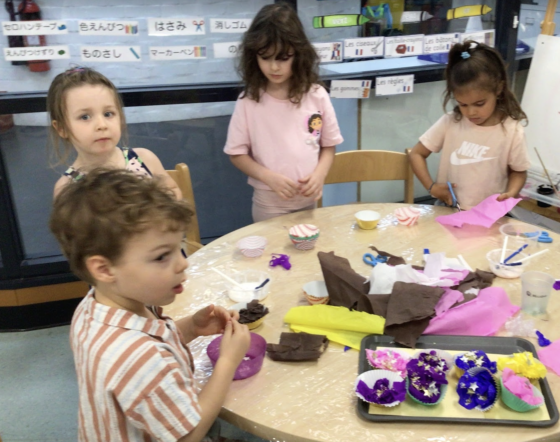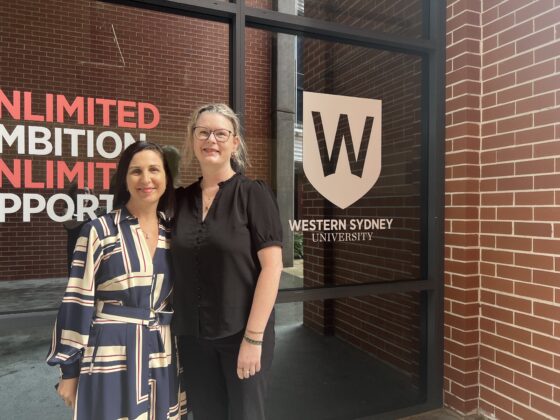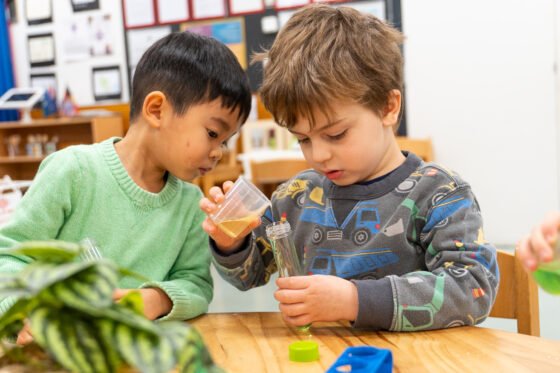Towards the end of Term 1, Victoria Kirkwood (Director of Early Learning) and Sarah Herbert (Head of Children’s Programs) were incredibly excited, privileged and grateful to embark on the learning opportunity of an Early Childhood Teacher’s lifetime attending the international study program at the Loris Malaguzzi International Study Centre in the beautiful town of Reggio Emilia, a short drive outside Bologna, Italy. We joined a delegation of 400 teachers and school leaders from 46 countries, including 64 delegates from all around Australia, to take part in the study program and share in the vision of high quality architecture and educational design for infants and young children (0 to 12 years). An opportunity to overcome national boundaries to place the rights of children at the centre of our work.

Reggio Emilia is an Italian city where early childhood education is at the core of its identity – a place to delve deeply as we continue to make progress in regards to the IGS Strategic Plan action to transform early childhood.
The study tour to Reggio Emilia provided uninterrupted time for deep thinking and learning.
The work and educational research from the Reggio Emilia schools and infant toddler centres continue to profoundly influence current pedagogy and practice in early childhood education and care across the world – a global outlook.
The principles of the Reggio Emilia educational approach strongly align with our IGS philosophy and values, as well as the Australian national curriculum and the Early Years Learning Framework (EYLF). The study tour reinforced many aspects of practice we have worked collaboratively to achieve in the Early Learning Centre at IGS. Our current focus on Slow Pedagogy (refining rhythms, routines and timetables to support deeper learning) is intricately linked to the Reggio Emilia approach to organisation and reinforced the progress we are making in the IGS Strategic Action to transform early childhood education by providing the youngest children of IGS with opportunities for deep, authentic and thoughtful learning experiences.
The study program involved in-depth lectures and workshop sessions presented by internationally renowned pedagogistas, atelierista and their teaching colleagues from the surrounding Infant Toddler Centres, Preschools and the Loris Malaguzzi Primary School. We visited several exceptional schools of Reggio Emilia including the Balducci Preschool who the Australian Reggio Emilia network shares a special affiliation.
The schools of Reggio Emilia continue to embed the educational approach pioneered by Loris Malaguzzi, following the fall of fascism and the fight for freedom during the second world war – an educational approach born from democracy.
Reggio Emilia – the resistance town; the liberation of Italy
‘Essere Liberi’ – to be free. A desire for justice that prompted the partisans to fight and an approach to early childhood education with deep historical roots with women playing a central role.
To set the scene for the context of the study program we visited Museo Cervi (Cervi Museum) – dedicated to the best-known family of the Italian Resistance. The Cervi brothers, from Reggio Emilia became martyrs in the fight against fascism during WWII. The brothers (and two sisters), from a hardworking farming family, were taught how to read by their mother, and read widely, when they were not working in the fields. The Cervi family pioneered modern methods of farming (purchasing the first tractor in the area) and broke free from oppressive farm leasing agreements which disabled farming families from making financial progress and improvements for their future.
Sadly, the seven brothers, part of the Italian resistance, were executed on the same day for their refusal to betray their comrades. Their sacrifice symbolises the values of freedom, justice, and standing up for what was right, in the times after the downfall of Mussolini.
This spirit of solidarity and community is deeply embedded in the Reggio Emilia approach to education. It emphasises the power of social interaction, collaborative learning and respect for active and individual rights. Just as the Cervi brothers fought as a united group for the good of their community, the Reggio Emilia philosophy highlights the role of participation and community – children, parents, teachers and other community members – in shaping education.
A culture of education steeped in the history of resistance and democracy
The story of the Cervi family helped to shape the Italian democratic republic. The Cervi family is a symbol of freedom and this is reflected in the Italian constitution. The Cervi children studied a world globe and this artefact, still in the museum today symbolises knowledge, peace and fraternity between all people – in parallel to the globe symbol steeped in the history of our own school here at IGS.
The Cervi family story provides many important and powerful messages:
- The need to have courage to believe in freedom;
- To do all we can, even if it is small;
- To change what we have the power to change;
- To make the choice to strive for freedom; and
- That even after the harvest, there is always another, to go on
In 1971, the first infant toddler centre (0 to 3 year old children) of Reggio Emilia was named in memory and honour of the mother of the 7 sons, Genoffa Cervi – the Municipal Infant-toddler Centre Cervi.
A new idea of school and children
After WWII it was a difficult time for the city of Reggio Emilia – buildings were destroyed and people were suffering. They began constructing for the future. Even in difficult times the people of Reggio Emilia wanted to make a difference. A tank in the city left behind from the war was sold and there was money available from the sale – men wanted to buy equipment to work in the fields, women said it was important to use this money to build a school for the children and this is what occurred. In this case, women made the revolution and so began the schools pioneering the Reggio Emilia approach. The first municipal preschool was built in 1963 by the community.
The most recent research studies state the first 6 to 8 years of a child’s life are the most fruitful years of our future possibilities – for this reason the schools of Reggoi Emilia place emphasis on the importance of the ways that they work with children from 0 to 8 years. There’s an understanding that you can’t recover what was missed in the first 6 years of life; particularly the quality of these possibilities (Daniela Lanzi, 2025).
In the schools of Reggio Emilia there is an emphasis not to teach children what they can find out for themselves – for children to be the authors of their learning processes; for children to learn how to learn through the construction of knowledge with other children in the social settings of early education.
For more information about the key principles of the Reggio Emilia educational approach please refer to the Reggio Children website.
A place of research
“The art of research is already in the hands of children highly sensitive to enjoyment of wonder. The pleasure of learning, of knowing and of understanding is one of the first fundamental sensations every human being expects from experience they confront alone or with others” L.Malaguzzi
Research happens everyday in the schools of Reggio Emilia. At the core of the approach is a deep collaboration of all staff and stakeholders; from cooks, to parents, children, community members and pedagogista. Educators ask children to identify their questions – the educator builds the answer together with the children; children become co-constructors of knowledge with teachers.
In the Reggio Emilia approach, children are given the capacity to become researchers – in this way they can be prepared for the world and what it may become in 20 years from now. An approach that supports children to become ready for the world – and a close synergy with IGS and our global perspective.
State Primary School Teacher from the Loris Malaguzzi School, Rossella Cigarini, shared “Every area of knowledge has a thread of beauty and aesthetics – there are no things that are uninteresting”. Rossella explained that “perhaps we have people around us who no longer have a sense of wonder and awe that they once had as children. The children teach us instead that beauty is there – they teach us that one problem has many different ways of looking for solutions. There are many worlds in front of us – as educators we have a responsibility for maintaining a sense of awe, of wonder” (Cigarini, R. 2025).
Confronto
To build a peaceful world we must educate in peace and start early. It’s a long process that must begin as soon as possible; the seeds of belief are planted.
The schools of Reggio Emilia foster crucial moments for children to confront each other; express their ideas without dominating others. “Expression, discussion and dialogue are not learned from watching a YouTube video” (Federico Ruozzi, President of Preschools and Infant Toddler Centres, 2025).
Early education has a crucial role in cultivating positive and equitable relationships. Nurtured from the earliest years of life to form a climate of inclusion. Education is the right of all children and as such it is a responsibility of the entire community. Early education is a place where the promotion of peace is practiced; through listening, dialogue and conversation. In the schools of Reggio Emilia democracy is built everyday during interactions between children and adults.
What does it mean to have a conversation with children?
Atelierista Filippo Chieli asked study tour participants “What does it mean to have a conversation with children?”. A good conversation with children is when the questions are not all asked by the adult. A good conversation is when children begin asking one another questions.
The Reggio Emilia approach invites teachers to reflect deeply on the way we provide a structure for authentic and meaningful dialogue amongst children and with teachers.
The creative power of error
Where there is imperfection, something happens – an event, process, a change, relationships. Where there is perfection everything has already occurred – there is nothing left to narrate.
Error is an essential condition of complexity. Mistakes are not failures; rather, they are generative processes for building knowledge. Failure is not seen as a defeat but rather a key part of the learning process; error being an essential condition of complexity.
Proggetzione. A birthplace of projects
“Pedagogy is movement, constant movement. I don’t believe that pedagogy knows everyday where it’s going or might go. It is a direction that is discovered as you are travelling” L.Malaguzzi
“Progettazione is a strategy of thought and action that is respectful and supportive of the learning processes of the children and the adults; it accepts doubt, uncertainty, and error as resources”. D.Lanzi, 2025.
Lanzi spoke about the importance of children and educators becoming a learning group, she stated “it’s not sufficient to just be in a room together – relationships need to be built so they can become a learning group together”. These groups are not only places of instruction but also centres of construction of personal identity and collaboration – places where cultural reciprocity is practiced, which brings greater awareness on the part of children for what they are doing, how they are doing it, and why (Bruner, J).
Environments and Documentation as a Second Skin
The schools of Reggio Emilia wear a second skin – documentation reflects the school identity, values, a strong sense of welcome and learning experiences. In the schools, through documentation, there are traces of experiences from the past that tell you more about the educational projects of the service and an ability to literally breathe the learning opportunities in the environment. At IGS we look forward to the opening of the beautiful new Kindergarten Centre learning environment this term, inspired by the Reggio Emilia approach for children in their first year of formal schooling.
Children and adults have the right to beautiful environments – filled with opportunities and possible means.
Documentation on the walls gives a sense of the environment being lived and tells us where we progressed with our thinking and learning as a learning community.
The environment provokes questions, based on the way that it is set – it talks to us beyond words; it talks to our senses.
A culture of Ateliers
Children as the origin of creativity
From 1972 the founder of the unique Reggio Emilia educational approach, Loris Malaguzzi, introduced the role of the Atelierista in schools. The Atelierista forms part of the workgroup of staff and brings their competencies to the team (it’s not an occasional visit).
The Atelierista plans experiences that take place on a daily basis throughout the school year – in a similar way to the Early Learning Music Specialist weaving and embedding music focussed experiences throughout the curriculum and daily activities of the children in our Early Learning Centre at IGS.
“The Atelier can be a place to go deeper with our hands, and a place where we can train our eyes. A place where we can train our taste and make and test theories” (Marco Spaggiatri – Atelierista 2025).
The 100 is There
The Atelier is a place that welcomes the expression of 100 languages; tools that are languages – expressive and communicative languages…..a hundred thoughts, a hundred ways of thinking.
As a social society, languages keep us together – we acknowledge and encourage expression in all its forms.
NO WAY. THE HUNDRED IS THERE
The child
is made of one hundred.
The child has
a hundred languages
a hundred hands
a hundred thoughts
a hundred ways of thinking
of playing, of speaking.
A hundred always a hundred
ways of listening
of marveling of loving
a hundred joys
for singing and understanding
a hundred worlds
to discover
a hundred worlds
to invent
a hundred worlds
to dream.
The child has
a hundred languages
(and a hundred hundred hundred more)
but they steal ninety-nine.
The school and the culture
separate the head from the body.
They tell the child:
to think without hands
to do without head
to listen and not to speak
to understand without joy
to love and to marvel
only at Easter and Christmas.
They tell the child:
to discover the world already there
and of the hundred
they steal ninety-nine.
They tell the child:
that work and play
reality and fantasy
science and imagination
sky and earth
reason and dream
are things
that do not belong together.
And thus they tell the child
that the hundred is not there.
The child says:
No way. The hundred is there.
Loris Malaguzzi (translated by Lella Gandini)
New possibilities for our children
The Loris Malaguzzi International Study Centre has been welcoming teachers to their programs, from humble beginnings, for more than 30 years. With representation of teachers worldwide, what continues to drive their work is new possibilities for children – in Reggio Emilia and the world. A commitment to preserving and defending the uniqueness of the Reggio Emilia educational approach.
As delegates of the 2025 International Study Program, we are committed to standing together, working together and collaborating for the benefit of children as active citizens – both within IGS and in solidarity with our teaching colleagues worldwide – a global outlook, in keeping with the motto of our incredible school.








